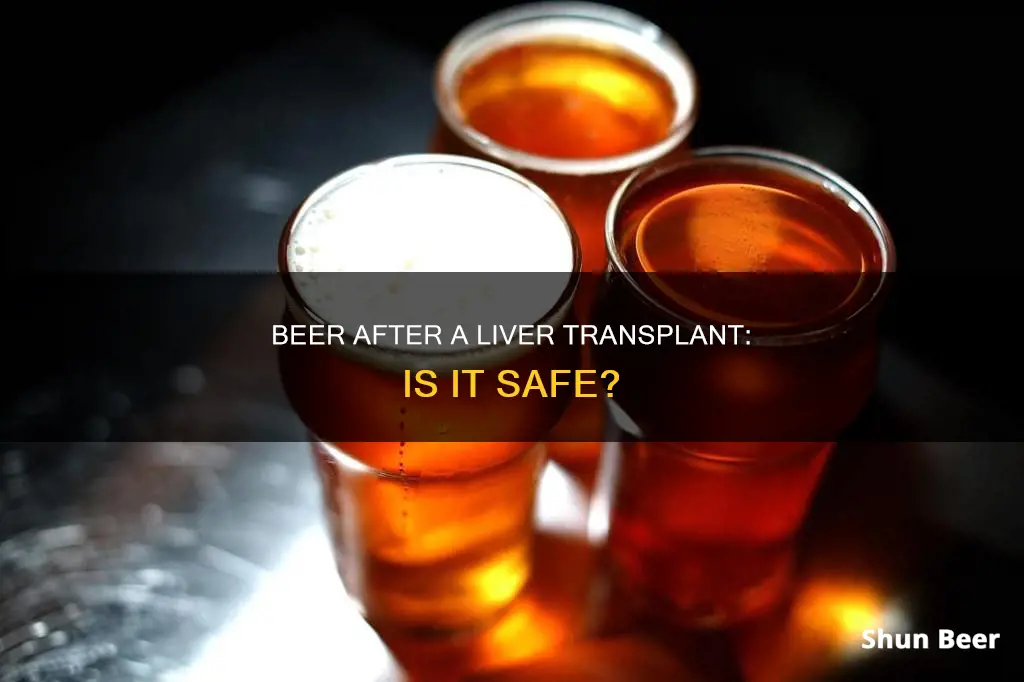
Alcoholic liver disease is one of the most common reasons for liver transplants. However, the question of whether a liver transplant recipient can ever drink alcohol again is a complicated one, and the answer varies from case to case.
The majority of liver transplantation programs require six months of complete abstinence before a patient is listed for a transplant, with the aim of allowing the liver to recover spontaneously and to overcome addiction issues. After a transplant, it is recommended that patients completely abstain from alcohol to avoid addiction issues and potential harm to the transplanted liver. Even occasional drinking may cause damage to the new liver, and there is a high risk of returning to harmful levels of alcohol consumption.
However, some liver transplant recipients do drink alcohol occasionally, and there are reports of doctors permitting this in certain cases. The consensus is that harmful levels of alcohol consumption are associated with increased rates of graft rejection and failure, as well as reduced long-term survival. Therefore, it is important for liver transplant recipients to discuss their alcohol consumption with their doctor and carefully follow their recommendations.
| Characteristics | Values |
|---|---|
| Alcohol consumption after a liver transplant | Alcohol consumption after a liver transplant varies from person to person. Some sources suggest that alcohol consumption is not completely off the table, but it should be limited to the occasional drink. However, the majority of sources claim that alcohol should be avoided at all costs. |
| Alcohol consumption and medication | Alcohol can interfere with the metabolization of certain medications. |
| Alcohol consumption and liver health | Alcohol is toxic to the liver. |
| Alcohol consumption and liver transplant survival rates | Alcohol consumption after a liver transplant has been associated with an increased risk of graft loss and advanced allograft fibrosis. |
| Alcohol consumption and liver disease recurrence | Certain liver diseases can reappear in the new liver. |
| Alcohol consumption and cardiovascular health | Mortality after a liver transplant is rarely due to recurrent alcoholic cirrhosis. Instead, it is often attributed to cardiovascular disease and de novo malignancies. |
What You'll Learn
- Alcoholic liver disease (ALD) is a common reason for liver transplants
- Abstinence is recommended to allow liver recovery and overcome addiction
- Alcohol relapse can lead to graft damage and even death
- Alcohol is toxic to the liver and can interfere with medication
- There are no established risk factors to predict alcohol relapse after a transplant

Alcoholic liver disease (ALD) is a common reason for liver transplants
Liver transplantation is currently the only definitive treatment for severe (end-stage) liver failure. ALD is the second most frequent reason for liver transplantation, after hepatitis C infection. However, liver transplantation for ALD remains controversial due to the shortage of donor organs. There is a concern that patients may resume drinking, thereby damaging the transplanted liver.
To address this concern, transplant centers conduct careful screening procedures to identify patients who are most likely to remain abstinent after a liver transplant. Studies have found that the survival rates of the transplanted organ and the patient were comparable to those of patients with non-alcoholic liver disease, and that relapse rates among ALD patients were low.
Beer on Tuesday: Yay or Nay?
You may want to see also

Abstinence is recommended to allow liver recovery and overcome addiction
Abstinence from alcohol is recommended after a liver transplant to allow the liver to recover and to overcome addiction. Alcoholic liver disease (ALD) is a common reason for liver transplantation. However, it is a complicated issue from both medical and ethical standpoints, as it is often considered a "self-inflicted disease".
Complete abstinence from alcohol is crucial to address addiction issues and allow the liver to recover spontaneously. The risk factors for relapse include the presence of anxiety or depressive disorders, a short duration of sobriety before the transplant, and a lack of social support. Family counselling is highly encouraged to prevent a relapse.
Relapse can lead to various histopathological changes, graft damage, graft loss, and even a decrease in survival. Therefore, it is essential to carefully select patients for liver transplantation and prioritize those with a high probability of success.
Alcohol is toxic to the liver and can interfere with the metabolization of certain medications. Even "non-alcoholic" beers may contain some alcohol. Thus, abstinence is recommended to protect the transplanted liver and ensure the effectiveness of medications.
While there may be varying opinions on occasional drinking after a liver transplant, the focus should be on maintaining abstinence to promote liver recovery and prevent addiction relapse.
Beer and Sertraline: What You Need to Know
You may want to see also

Alcohol relapse can lead to graft damage and even death
Alcohol relapse after a liver transplant has been associated with several complications, including graft rejection, graft loss, recurrent alcoholic cirrhosis, and reduced long-term patient survival. Graft loss from recurrent alcoholic liver disease is uncommon, but studies have shown that alcohol use after a transplant is associated with an increased risk of graft loss and advanced allograft fibrosis.
One study found that any alcohol relapse increased the risk of graft failure, but when subdivided by drinking pattern, a single slip or intermittent relapse was not associated with graft failure. However, continuous heavy drinking was significantly associated with decreased graft survival. Patients with alcohol relapse were more likely to have advanced fibrosis and more fatty changes and severe fibrosis.
The overall survival rates of patients transplanted for alcoholic liver disease are comparable to or higher than the survival rates of patients transplanted for other etiologies. While occasional slips are not associated with reduced survival, relapse to abusive or harmful levels of drinking is associated with increased mortality in these patients.
Beer Drinking: Allergies' Worst Enemy or Just a Coincidence?
You may want to see also

Alcohol is toxic to the liver and can interfere with medication
Alcohol is a toxin that can cause significant damage to the liver. The liver processes over 90% of the alcohol we consume. The rest exits the body through urine, sweat, and breathing. The liver can only process a certain amount of alcohol at a time. When someone has too much to drink, the alcohol left unprocessed by the liver circulates through the bloodstream, affecting the heart and brain. This is how people become intoxicated. Chronic alcohol abuse causes the destruction of liver cells, which results in scarring of the liver (cirrhosis), alcoholic hepatitis, and cellular mutation that may lead to liver cancer.
Alcohol can also be dangerous when mixed with medication. It often has harmful interactions with prescription medications, over-the-counter drugs, and even some herbal remedies. Alcohol can decrease the effectiveness of medications or render them useless. In some cases, it may even make drugs harmful or toxic to the body. Alcohol can also intensify the side effects of medication, such as sleepiness, drowsiness, and light-headedness, which can interfere with concentration and the ability to operate machinery or drive a vehicle.
It is important to note that even moderate drinking can have negative effects on the liver. According to the National Institute on Alcohol Abuse and Alcoholism (NIAAA), moderate drinking is up to one drink per day for women and up to two drinks per day for men. Binge drinking is defined as consuming five or more drinks for men or four or more drinks for women on the same occasion, at least once a month. Binge drinking can result in significant bodily impairment, damage, or even death.
For individuals with a liver transplant, the risks associated with alcohol consumption are even higher. Alcohol intake after a liver transplant can lead to relapse and cause damage to the transplanted liver. The risk of relapse is a significant ethical concern in the medical community regarding liver transplants for patients with alcoholic liver disease. Studies have shown that the presence of anxiety or depressive disorder, a short duration of sobriety before the transplant, and a lack of social support are risk factors for relapse.
Therefore, it is crucial for individuals, especially those with a history of liver disease or a liver transplant, to consult their doctor or pharmacist before consuming any alcohol while taking medication. The general recommendation is to abstain from alcohol or, at most, consume it in strict moderation.
Fish and Beer: A Curious Friendship
You may want to see also

There are no established risk factors to predict alcohol relapse after a transplant
Alcoholic liver disease (ALD) is the second most common indication for liver transplantation (LT). However, there are no established risk factors or scoring systems to predict alcohol relapse after LT. While the 6-month rule of abstinence pre-LT is a common prerequisite for LT listing, it is not a reliable predictor of alcohol relapse.
Several studies have found that a duration of abstinence of less than 6 months pre-LT is associated with alcohol use and harmful drinking post-LT. However, other studies have shown that the 6-month rule is not a strong indicator of future drinking. Based on conflicting outcomes, the 6-month rule may not reliably predict post-LT relapse.
Other factors that have been associated with an increased risk of alcohol relapse after LT include comorbid psychiatric conditions, lack of social support, and tobacco use. However, there are no validated scoring systems to predict the risk of alcohol relapse after LT.
While occasional slips of alcohol consumption may not cause significant graft damage, it is difficult to predict whether these slips could lead to complete relapse and harmful alcohol abuse. Relapse has been associated with different histopathological changes, graft damage, graft loss, and decreased survival in some studies. Therefore, it is important to carefully select patients for LT and prioritize those with a high probability of success.
Old Beer: Is It Safe to Drink After a Year?
You may want to see also
Frequently asked questions
No. Alcohol is toxic to the liver and can interfere with the metabolization of certain medications. Even "non-alcoholic" beers contain some alcohol.
Alcohol relapse after a liver transplant can lead to graft rejection and graft loss. It can also cause recurrent alcoholic cirrhosis, which can be fatal.
The rate of alcohol use after a liver transplant ranges from 7% to 95%. However, the true proportion is unclear due to a lack of standardized definitions for alcohol relapse.
Risk factors for alcohol relapse include comorbid psychiatric conditions, lack of social support, and tobacco use.







